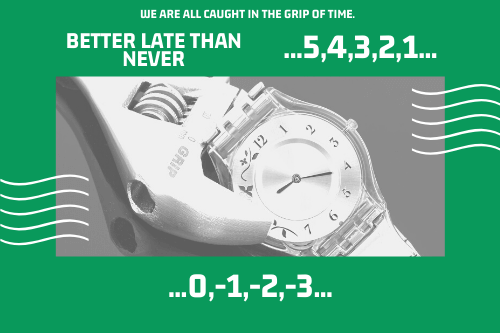
YouTube / iTunes / Spotify / Radio Public / Pocket Casts / Google Podcasts / Breaker / Overcast
Listen to ArtisanEnglish.jp posts & lesson intros here.
Phrase: Better late than never
We are all caught in the grip of time.
Better late than never is a very positive way to look at life and how everything seems to work out – eventually.
Now, the phrase, better late than never, is often used when something we are expecting is behind schedule.
Of course, it’s better to receive something late than never to receive it at all.
Most humans, though, have very little understanding of this concept.
Life is full of arbitrary deadlines that don’t mean a thing.
All they serve to do is force people to rush and cause more misery and grief than necessary.
After Typhoon 19 in the Kanto area, I realized how much city-dwellers are slaves to the clock.
It was the largest typhoon to hit the metropolitan area in 50 years, yet thousands of people lined up at closed stations to catch trains that weren’t running.
That caused me to wonder what was so important that they had to be at work.
What was so important that it could not wait a few hours?
The answer, of course, is nothing.
The world did not end because Tokyoites were late for work.
If being late for work after a significant disaster puts you in danger of losing your job, then you work for a crap company.
One of my little beliefs is everything gets done.
Yes, there are times when we feel we have to hurry, but those times should be few and far between.
I’d rather receive a late, well-written and thought-out essay from a student than something written in a rush and of low quality.
In this world of unforgiving deadlines, we should be able to cut others some slack and realize sometimes it’s better late than never.
Flesch-Kincaid Readability Test
This post is understandable by someone with at least a 7th-grade education (age 12).
On the Flesch-Kincaid reading-ease test, this post scores 73.
The higher the score on a scale of 0 – 100, the easier the passage is to read.

